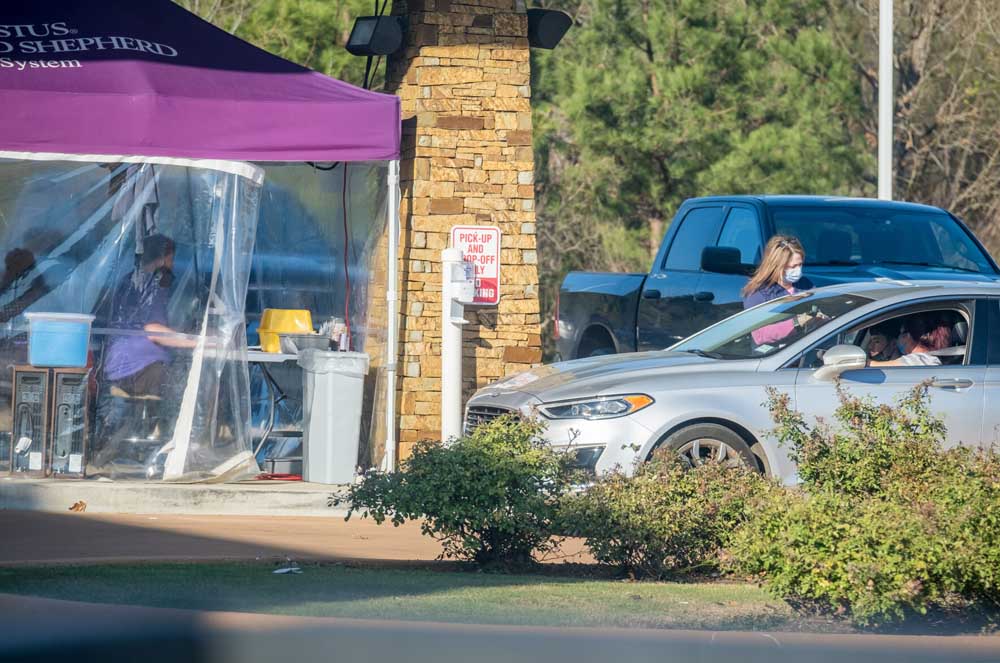Testing again a challenge as omicron concerns send patients to Longview-area ERs
Published 5:30 pm Thursday, January 6, 2022

- Christus Good Shepherd is offering drive-thru testing daily at its NorthPark facility on East Hawkins Parkway in Longview.
Local health officials are looking for other ways to offer COVID-19 testing as the recent omicron variant has swamped Longview-area hospitals with residents who want to know if they have the virus.
Gregg County Health Authority Dr. Lewis Browne on Wednesday said half of the people who are presenting in the county to determine if they have COVID-19 are getting a positive result, and he said many are going to hospitals to find out.
Trending
According to Browne, Gregg County’s two hospitals are again reaching high patient levels due to people visiting ERs to get tested. He said Longview Regional Medical Center has surged with patients who are seeking COVID-19 tests.
“They’re basically full, which means elective surgery and stuff is now at a very critical situation,” Browne said.
Essentially, if a person was to require emergency medical assistance or had an elective surgery and got admitted into the hospital, “that’s going to be a very hard thing to do,” Browne said. However, he said people do not seem to be getting as sick with omicron as they did with other variants.
He added that the biggest recent challenge is finding a place to get tested without having to use an ER.
According to Browne, many residents turn to ERs and similar facilities to get tested for COVID-19. This has resulted in hospitals overflowing with patients who are primarily seeking COVID-related services.
Browne said he has been in communication with the Northeast Texas Public Health District to try to determine other ways to offer testing without having to go to the ER or emergency clinic. He also said testing methods have become difficult to obtain because of a shortage of materials.
Trending
Christus Good Shepherd is offering drive-thru testing 10 a.m. to 6 p.m. daily at its NorthPark facility on East Hawkins Parkway in Longview.
Browne also made a plea to people who have decided not to get vaccinated to “really seriously consider it” along with advising those who have been vaccinated to get their booster six months later.
The high number of COVID-19 tests also has been a problem in other parts of the state. Dr. Ralph Riviello, the chair of emergency medicine at University Hospital in San Antonio, said the number of people who arrive seeking a test has grown so much lately that the ER now has a nurse provider designated to screen and evaluate patients with COVID-like symptoms, according to the Texas Tribune.
The hospital staff helps whoever arrives, but Riviello said the health care system does not have the bandwidth to serve as a walk-in COVID-19 testing center.
“That burden puts stress on the system, on that emergency department. Those patients will take up space and rooms that they may not need,” he told the Tribune. “And then that delays the care of another patient.”
Pharmacies’ supply of rapid antigen tests also has been drained, and appointment availability at testing centers has been limited.
In Austin, the city health department has asked residents to stop calling 911 for testing information. Other emergency rooms across the state are also reporting a jump in testing requests, prompting hospitals to ask Texans to stop visiting the ER for COVID-19 tests, the Tribune reported. Riviello encourages those experiencing mild symptoms to stay home if they cannot acquire a test.
CVS and Walgreens pharmacies have instituted a limit on testing products in stores and online to increase access for more people. A Walgreens spokesperson said the pharmacy was working with its lab partners to expand testing capacities.
In response to the high demand for tests, the Federal Emergency Management Agency will open six testing sites in Texas as early as next week. The sites will be in Bexar, Cameron, Dallas, Harris, Hidalgo and Tarrant counties. The new testing locations received preliminary approval Monday after Gov. Greg Abbott requested additional federal resources to help mitigate the spread of the virus.
State health data shows the positivity rate in the state — or the percentage of COVID-19 tests that come back positive — has reached a record high, with about 1 in 3 Texans testing positive for the virus. The number of hospitalizations has more than doubled over the past two weeks.



